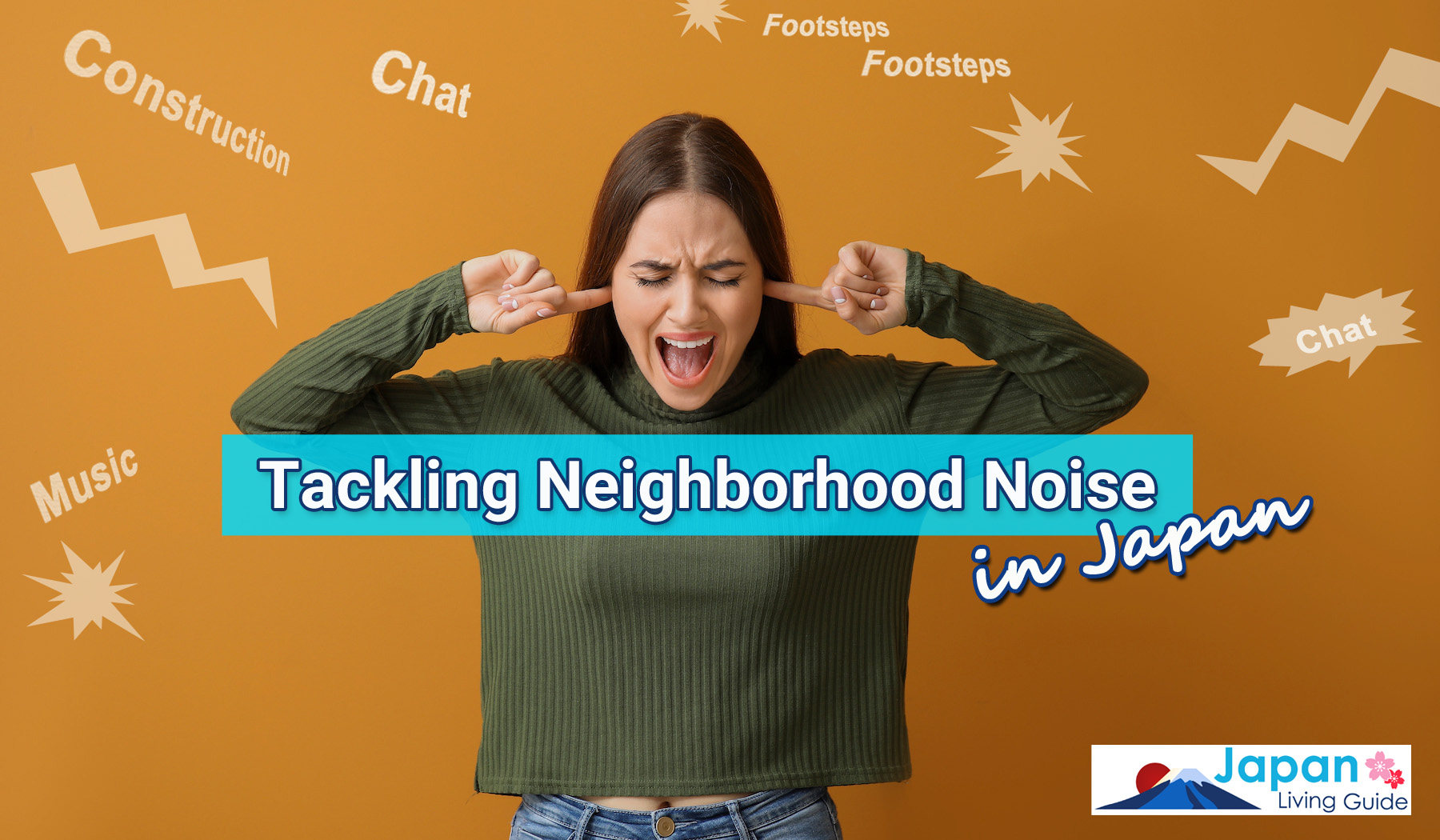Quiet Living: Tackling Neighborhood Noise in Japan

Japanese cities, especially Tokyo, are some of the most densely populated areas in the world, with many apartment buildings and tightly packed residences. This is convenient for housing the large population of Japan but can lead to noise problems.
Different people have different noise tolerances, there are different understandings of acceptable times for making noise, and you need to consider those around you. Some common noise issues in apartment living include loud footsteps and doors, vacuums and washing machines, and TV and music sounds.
These noises can be annoying to neighbors living below or next to you, so we can explore some of the ways to mitigate these issues.
A Different Approach to Apartment Construction
While living in Japan, especially in apartments, it is essential to be considerate of your neighbors when making noise. In Japan, the architectural design and construction of many buildings often prioritize factors such as space optimization and earthquake safety over soundproofing measures. This leads to structures characterized by relatively thin walls and single-pane windows that unfortunately do not provide much in the way of sound insulation.
These components, while cost-effective and efficient for the high-density living typical of Japan's urban landscapes, are unable to effectively dampen noises emanating from both external sources, such as traffic and pedestrian chatter, and internal ones, like household appliances and conversations. As such, residents often grapple with a heightened auditory awareness of their surroundings, creating an environment that some might find intrusive and uncomfortable, thus challenging the notions of privacy and quietude within these spaces.
Understanding Japan's Noise Laws

There are no exact civilian regulations, as most noise regulations are regarding traffic, aircraft, and trains. However, there is a common expectation of noise no louder than 50 decibels at night and 60 decibels during the day. This can vary, as busier areas often have higher noise levels.
In the case of excessive noise levels, several actions can be taken. In an apartment building, the first step is commonly a complaint to building management. This will often result in a general notice being sent to all apartments. If the complaints continue, a more specific notice may be sent to the apartment in question, or they may be contacted directly by the management. It is also common for police to be called for noise complaints; for some people, this is a first step rather than a last resort. Generally, the police will caution the people creating noise to try and be quieter in the future.
Please also refer to these pages for consultations.
* Free Legal Consultation in English for Foreign Residents in Japan
* Where Can Foreigners Ask for Advice on Living in Japan?
How to Deal with Noisy Neighbors

Having a noisy neighbor can significantly disturb your quality of life, especially if they are loud during the night while you are trying to sleep. If you have a neighbor who is frequently noisy, there are several steps you can take to address the issue.
The first thing is to not jump to action. Many people have one-off occasions where they might be louder than usual, which could cause more problems if you complain about every possible instance. Instead, holding back and complaining about frequent issues is best. In this case, the first step is to contact the management company of the apartment building. If the problem doesn't improve, continue getting them so they can address the possible noisy apartments directly.
When there are noise issues in Japan, it is uncommon for neighbors to talk directly to each other about the problem. This can be seen as too direct and bordering on rude. At most, leaving a polite note is an acceptable way to directly communicate with the problem neighbor. However, it is generally best to leave all communication through the property management or, if things escalate, the police.
Suppose the issue is ongoing despite the best efforts of yourself and the property manager. In that case, you can call the police to make a noise complaint (when the noise is occurring). This may be the wake-up call if other methods have yet to work.
How to Avoid BEING a Noisy Neighbor

Suppose you are on the other side of the situation and are the neighbor receiving complaints. In that case, it is essential to examine and address your behavior. Complaints can be unreasonable, and for there to be little to no actions you can take. Still, it is always best to attempt to mitigate the problem. These can include the following.
Rules
Your building likely has various noise-related regulations, so familiarize yourself with them. For example, they may forbid keeping pets or practicing musical instruments.
Time
It's easy to forget the time and end up being loud late at night or very early in the morning and accidentally disturbing your neighbors. Keeping any noise within daytime hours is the most helpful thing. Be careful not to use the washing machine or vacuum cleaner at night, and either not watch TV or only use a low volume at night.
Walls
Try to place sound-emitting devices away from walls that you share with your neighbors. For example, TVs, sound systems, washing machines, or dryers.
Footwear
The noise of loud footsteps can be addressed by wearing socks or slippers inside and avoiding high heels or loud shoes outside your neighbors' apartments.
Floors
If you work out at home, consider using some rug or mat to muffle any thumping sounds that might pass through to people below you.
Soundproofing
Consider purchasing some soundproofing panels online.
Headphones
If you live alone, it should be easy to switch to using headphones instead of using speakers for your various devices.
Talking
Whether having friends over or participating in a Zoom meeting, it can be easy to get carried away and speak louder than necessary.
Finding a Quieter Apartment
One of the best ways to address noise issues is when choosing an apartment. Having an apartment with less likelihood of noise problems reduces the possibility of needing to use any of these solutions. This can be difficult, as it is nearly impossible to have a definitive answer on the noise in an apartment during the inspection. However, there are some aspects to consider.
Firstly, the material used in the structure is essential. Reinforced concrete is the most likely to reduce noise issues and is common in modern apartment buildings. Noise travels quickly in wood or steel structures, so noise issues are likely higher.
Another aspect to consider is the apartment placement. Corner apartments are a good option, as they have fewer shared walls and fewer neighbors. Top-floor apartments have an advantage for a similar reason – no upstairs neighbors exist. This makes the ideal apartment the corner on the top floor, but having one of the two will still help the issue.
How to File a Noise Complaint in Japan
When considering filing a noise complaint, your information must be as factual as possible. Keep records of what noise you hear, when, for how long, and if you know where it is coming from. If you can record the noise with a sound recorder, this will help.
Writing a complaint to the property manager should be as informative as possible without being emotional. Describe the issue, add any additional details, and ask for their help in solving this issue.
If you need to involve the police, call the 110 non-emergency lines to make a noise complaint. The police will then come and talk to you before going to speak to your neighbor. If the police become involved multiple times, your records will become vital to show the repeated instances.
Mastering the Art of Noise Control in Japan's Dense Living Spaces
Problems with different tolerances and understandings of what is acceptable noise occur worldwide. However, due to the high amount of apartment buildings and close living in Japan, minor issues can quickly become an ongoing problem. It is essential to avoid becoming the cause of a noise issue for your neighbors while being aware of how to best approach a noisy neighbor. Using some of the solutions above can help you to improve a noisy living situation and create a calmer environment for everyone.
If you found this article helpful, be sure to check out our other content on living and everyday life in Japan, too

















